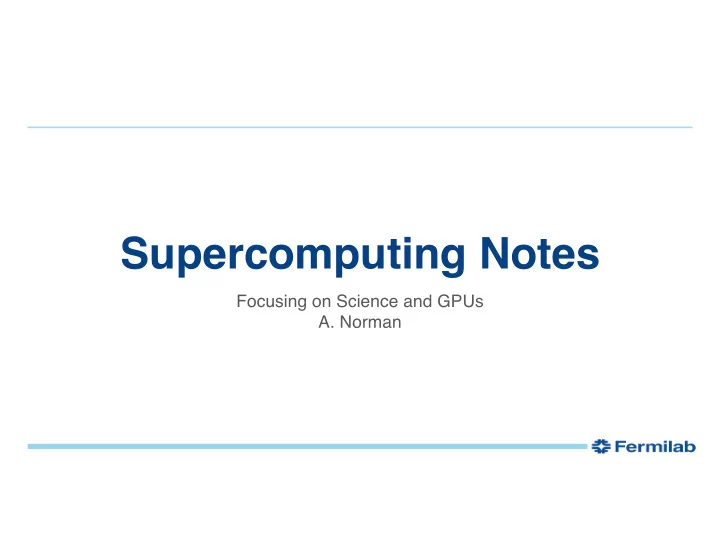

Supercomputing Notes Focusing on Science and GPUs A. Norman
GPU Impressions • Common theme from all major GPU players booths (Nvidia, AMD, Intel) – “Our specialized <language, libs, API> is what you should use” – “But if you don’t you should use OpenMP, you’ll take a 10-20% performance hit on most standard code relative to hand optimized algorithms” – Booths were all showing the same benchmarks • Compiler booths are similar – Emphasize their support for OpenMP 4.x – All (but PGI) claim to have the best implementation* – Nvidia emphasizing pre-optimized libraries of standard algorithms for STL containers *on whichever flavor of GPU they specifically support
OpenMP Training • New spec 5.0 is out but… – Real progress is on distilling down to the “common core” and compiler support for 4.5 – Essential directives and patterns that cover most scientific use cases • OpenMP was touting this (passing out cheat sheets), talking up new book. • Major initiative towards onboarding applications quickly – Compilers are better optimization for common core directives (i.e. sensible default behaviors less tuning) • https://www.openmp.org/resources/openmp-compilers-tools/ – Tutorial was actually VERY good (joint with NERSC) • Easy to replicate – Low hanging fruit for some experiment code • GPU offloading a minimal extension to common core
OpenMP GPU Training • Simplified offloading to target devices in the base part of the spec – Builds directly off common core directives – Can effectively swap out a single directive in most cases to go from OpenMP parallel to OpenMP GPU accelerated – Performance is “meh…” without tuning and memory model considerations – Example codes were getting get 4-8x ish boosts – Tune examples get 20x • Value is in portability and ease of migration – Very real possibility for our science codes that don’t lend themselves to hand optimization – Documentation and training materials are good
GPU Hackathon • Connected with GPU Hackathon team – Learned more about what to expect and how to schedule a hackathon (this is in the NESAP context of our NESAP project) – For application porting they want: • 1-3 people to participate (coder, algorithm person, person for testing) • Start 4-6 week before actual hackathon • Need code to compile using Cray compiler • They want a kernel identified if possible, but are willing to work with more generalized code •
Rescale • Single API (and accounting!) for AWS, Google, Microsoft • Can buy time through them or… – Bring your own allocations (specifically asked about Heidi usecase of a Microsoft Educational allocation) • Claim to have HARD CAPS and cut offs on per group basis and linked to funding and administrative limits. – Want to see accounting interface • This actually may be a viable path to avoid separate integration for each cloud system. Would want to see more.
IBM • Was given the briefing (hard sell) on LSF batch • Claim is that it can scale now. • Lacks various accounting controls and monitoring • Want us to use it with HEPCloud • Want to do a more complete briefing for us
Recommend
More recommend